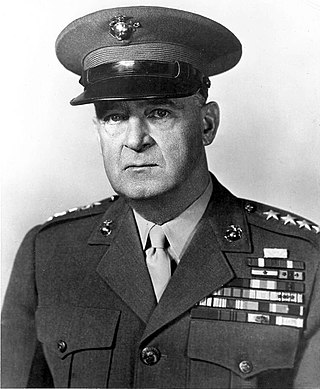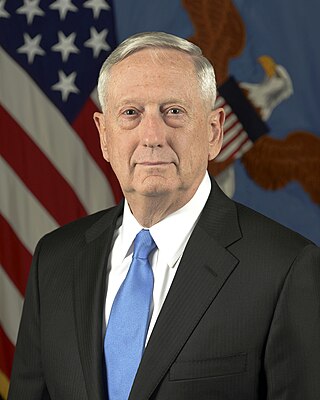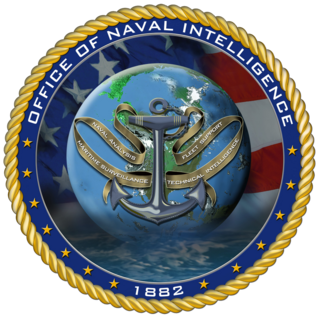
Charles Chandler Krulak is a retired United States Marine Corps four-star general who served as the 31st Commandant of the Marine Corps from July 1, 1995 to June 30, 1999. He is the son of Lieutenant General Victor H. "Brute" Krulak, who served in World War II, Korea, and Vietnam. He was the 13th President of Birmingham-Southern College after his stint as a non-executive director of English association football club Aston Villa.
Military doctrine is the expression of how military forces contribute to campaigns, major operations, battles, and engagements. A military doctrine outlines what military means should be used, how forces should be structured, where forces should be deployed, and the modes of cooperation between types of forces. "Joint doctrine" refers to the doctrines shared and aligned by multinational forces or joint service operations.

John Richard Boyd was a United States Air Force fighter pilot and Pentagon consultant during the second half of the 20th century. His theories have been highly influential in military, business, and litigation strategies and planning.

The OODA loop was developed by military strategist and United States Air Force Colonel John Boyd. He applied the concept to the combat operations process, often at the operational level during military campaigns. It is often applied to understand commercial operations and learning processes. The approach explains how agility can overcome raw power in dealing with human opponents. It is especially applicable to cyber security and cyberwarfare.

Alexander Archer Vandegrift, was a U.S. Marine Corps four-star general. During World War II, he commanded the 1st Marine Division to victory in its first ground offensive of the war, the Battle of Guadalcanal. For his actions from August 7 to December 9, 1942, during the Solomon Islands campaign, he received the Medal of Honor. Vandegrift later served as the 18th Commandant of the Marine Corps. He was the first four-star general on active duty in the Marine Corps.

Holland McTyeire "Howlin' Mad" Smith, KCB was a general in the United States Marine Corps during World War II. He is sometimes called the "father" of modern U.S. amphibious warfare. His nickname, "Howlin' Mad" Smith, had been given to him by his troops in the Dominican Republic in 1916.

Maneuver warfare, or manoeuvre warfare, is a military strategy which seeks to shatter the enemy's overall cohesion and will to fight.

James Norman Mattis is an American military veteran who served as the 26th United States secretary of defense from 2017 to 2019. A former Marine Corps four-star general, he commanded forces in the Persian Gulf War, the War in Afghanistan, and the Iraq War.

The Office of Naval Intelligence (ONI) is the military intelligence agency of the United States Navy. Established in 1882 primarily to advance the Navy's modernization efforts, it is the oldest member of the U.S. Intelligence Community and serves as the nation's premier source of maritime intelligence.

James Henry Webb Jr. is an American politician and author. He has served as a United States senator from Virginia, Secretary of the Navy, Assistant Secretary of Defense for Reserve Affairs, Counsel for the United States House Committee on Veterans' Affairs and is a decorated Marine Corps officer.
Ralph Peters is a retired United States Army lieutenant colonel and author.

Marine Corps University is a military education university system of the United States Marine Corps. It is accredited by the Commission on Colleges of the Southern Association of Colleges and Schools to award Master's Degrees.
William S. Lind is an American conservative author, described as being aligned with paleoconservatism. He is the author of many books and one of the first proponents of fourth-generation warfare (4GW) theory and is the Director of The American Conservative Center for Public Transportation. He used the pseudonym Thomas Hobbes in a column for The American Conservative.

A colonel in the United States Army, Marine Corps, Air Force and Space Force, is the most senior field-grade military officer rank, immediately above the rank of lieutenant colonel and just below the rank of brigadier general. Colonel is equivalent to the naval rank of captain in the other uniformed services. By law, an officer previously required at least 22 years of cumulative service and a minimum of three years as a lieutenant colonel before being promoted to colonel. With the signing of the National Defense Authorization Act of 2019, military services now have the authorization to directly commission new officers up to the rank of colonel. The pay grade for colonel is O-6.
The structure of the United States Navy consists of four main bodies: the Office of the Secretary of the Navy, the Office of the Chief of Naval Operations, the operating forces, and the Shore Establishment.

Edwin Howard Simmons was a United States Marine Corps brigadier general. He was a career officer who served in combat during three wars — including landing at Inchon and fighting at the Chosin Reservoir in the Korean War. He was renowned as the official Marine Corps historian, being called "the collective memory of the Marine Corps". His 1974 book The United States Marines: A History is a seminal reference text.
The reconnaissance mission within the United States Marine Corps is divided into two distinct but complementary aspects; Marine Division Recon and Force Reconnaissance.
Patterns of Conflict was a presentation by Colonel John Boyd outlining his theories on modern combat and how the key to success was to upset the enemy's "observation-orientation-decision-action time cycle or loop", or OODA loop. Patterns developed the idea of a "counter-blitz", a blitzkrieg in reverse, with numerous attacks followed by withdrawals to the rear. The aim was to confuse the enemy by presenting no apparent strategy, reveal the enemy's intentions through the strength of the response, and present a misleading picture of the defender's own actions in order to disrupt the attacker's future plan of action.











